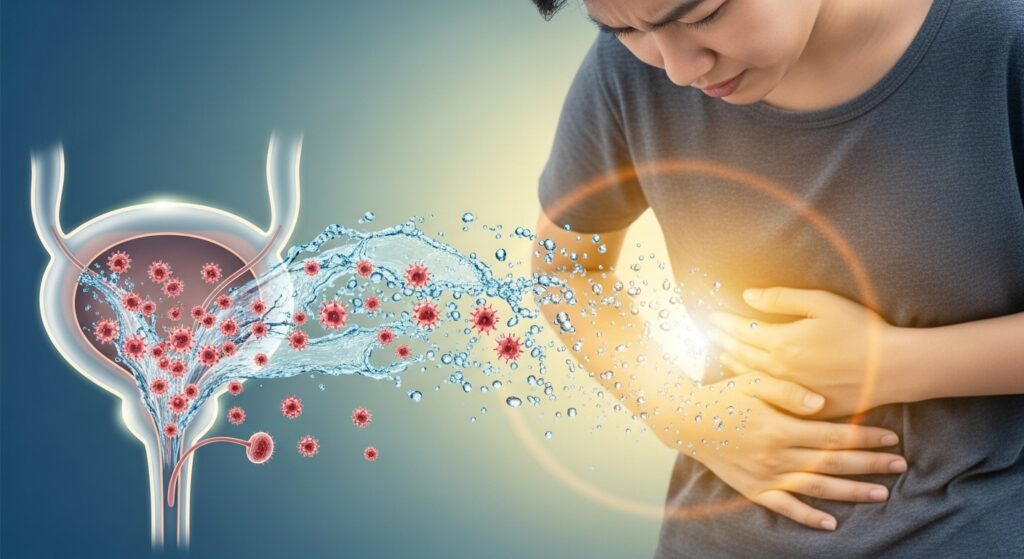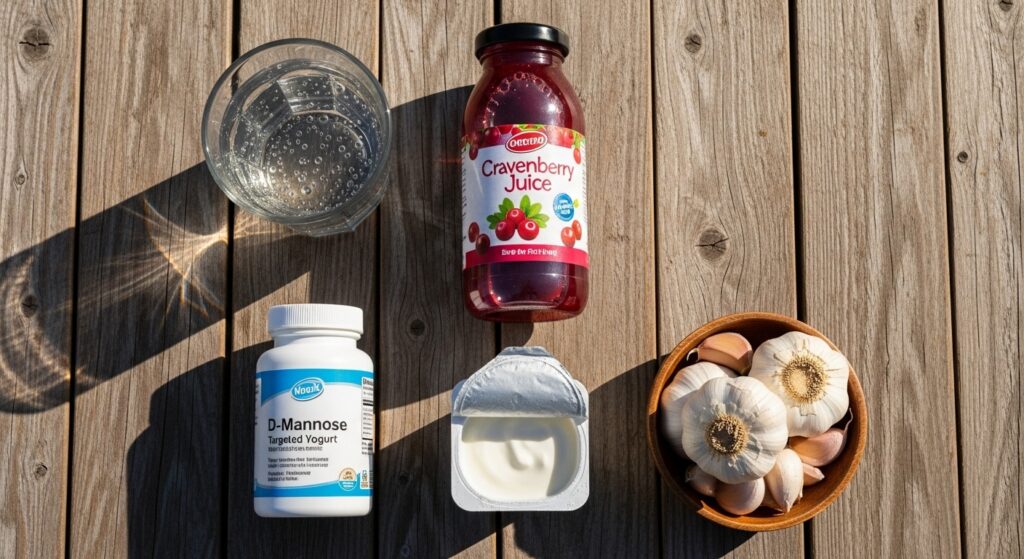Urinary Tract Infections (UTIs) are a common and often painful affliction, affecting millions worldwide. While antibiotics are typically the go-to solution, many people seek natural alternatives for relief, prevention, or as complementary treatments. Understanding effective home remedies for UTI can empower you to manage symptoms and potentially reduce the frequency of these uncomfortable infections. This comprehensive guide delves into the most popular and evidence-backed natural approaches, helping you find comfort and maintain urinary health.
UTIs occur when bacteria, most commonly E. coli from the gut, enter the urethra and begin to multiply in the bladder. Symptoms can include a persistent urge to urinate, a burning sensation during urination, passing frequent small amounts of urine, cloudy or strong-smelling urine, and pelvic pain. While home remedies can offer significant relief and aid in prevention, it’s crucial to understand their limitations and when to seek professional medical attention. Untreated UTIs can lead to more serious kidney infections, so vigilance is key.
Table of Contents
Understanding UTIs: A Quick Overview

Before diving into remedies, let’s briefly understand what causes UTIs and why they are so prevalent, especially among women. The female anatomy, with a shorter urethra, makes it easier for bacteria to travel from the rectum to the bladder. Other risk factors include sexual activity, certain types of birth control, menopause, kidney stones, and a compromised immune system. Early detection of symptoms and prompt action, whether through home remedies or medical intervention, is essential to prevent the infection from spreading.
The Role of Hydration: Your First Line of Defense
Perhaps the simplest yet most powerful home remedy for a UTI is increasing your fluid intake. Drinking plenty of water helps flush bacteria out of your urinary tract. When you’re adequately hydrated, you urinate more frequently, which helps to clear out the bacteria before they can firmly attach and multiply. Aim for at least 8-10 glasses (2-3 liters) of water daily, especially when you feel UTI symptoms emerging. This constant flushing action is critical in hindering bacterial growth.
Cranberry Products: A Timeless Remedy?
Cranberry has long been associated with urinary health, and for good reason. It contains compounds called proanthocyanidins (PACs) that can prevent bacteria, particularly E. coli, from adhering to the walls of the urinary tract. This makes it harder for the bacteria to cause an infection. While cranberry juice can be effective, it often contains high amounts of sugar, which can be counterproductive. Unsweetened cranberry juice, cranberry extracts, or supplements are generally preferred. Studies suggest that a daily intake of cranberry products can help reduce the risk of recurrent UTIs.
D-Mannose: A Natural Sugar for Bacterial Adhesion
D-Mannose is a type of sugar that is structurally similar to the receptors on the lining of your urinary tract. When ingested, D-Mannose binds to E. coli bacteria, preventing them from sticking to the bladder walls. Instead, the bacteria bind to the D-Mannose and are then flushed out of the body with urine. This natural sugar is readily available as a supplement and is often praised for its effectiveness in both treating and preventing UTIs, especially those caused by E. coli. It’s absorbed slowly and doesn’t significantly affect blood sugar levels, making it a safe option for many.
Probiotics: Restoring the Good Bacteria
Probiotics are beneficial bacteria that can help maintain a healthy balance of microorganisms in your gut and vagina. Certain strains, particularly Lactobacillus, have been shown to inhibit the growth of harmful bacteria that cause UTIs. By restoring a healthy vaginal flora, probiotics can create an environment less hospitable to E. coli. You can incorporate probiotics through fermented foods like yogurt, kefir, sauerkraut, and kimchi, or by taking high-quality probiotic supplements. They are particularly helpful after antibiotic use, which can deplete beneficial bacteria.

Other Effective Home Remedies for UTI Relief
Beyond the primary remedies, several other natural approaches can offer comfort and support during a UTI.
Heat Therapy for Pain Relief
Applying a warm compress or heating pad to your lower abdomen can help soothe the discomfort and pressure associated with a UTI. The warmth can relax muscles and alleviate cramping, providing temporary but welcome relief from pain. Ensure the heat is not too intense and avoid applying it directly to the skin to prevent burns.
Apple Cider Vinegar (ACV): A Controversial Option
Some proponents suggest apple cider vinegar can help treat UTIs due to its supposed antibacterial properties. However, scientific evidence supporting ACV as an effective UTI remedy is limited. While it might offer some general health benefits, it’s not recommended as a primary treatment for UTIs. If you choose to try it, dilute it heavily in water and do not use it undiluted, as it can be irritating.
Garlic: Nature’s Antibiotic
Garlic has well-documented antimicrobial and anti-inflammatory properties. Allicin, the active compound in garlic, has been shown to fight various bacteria and fungi. Incorporating raw garlic into your diet or taking garlic supplements might offer some supportive benefits in managing UTIs. However, like ACV, it should not replace conventional medical treatment for an active infection.
Parsley Water: A Diuretic Aid
Parsley has mild diuretic properties, meaning it can help increase urine output. This increased urination can aid in flushing out bacteria from the urinary tract, similar to drinking plenty of water. You can make parsley water by boiling fresh parsley in water, straining it, and drinking the cooled liquid. While it can be a helpful adjunct, it’s not a standalone treatment.
Comparative Overview of Popular Home Remedies
Here’s a table summarizing some common home remedies for UTI, their proposed benefits, and key considerations:
| Remedy | Proposed Benefit | Key Considerations | Evidence Level |
|---|---|---|---|
| Water (Increased Intake) | Flushes bacteria out of the urinary tract, dilutes urine. | Essential first step, no known side effects. | High |
| Cranberry Products | Prevents bacteria (E. coli) from adhering to bladder walls. | Unsweetened juice or supplements preferred; may not treat active infection. | Moderate to High (for prevention) |
| D-Mannose | Binds to E. coli, helping to flush it out. | Effective for E. coli UTIs; generally well-tolerated. | Moderate to High |
| Probiotics | Restores healthy bacterial balance, inhibits harmful bacteria. | Beneficial for prevention and post-antibiotic recovery. | Moderate |
| Heat Therapy | Relieves pain and discomfort in the lower abdomen. | Symptomatic relief only; does not treat the infection. | Anecdotal/Supportive |
| Garlic | Antimicrobial and anti-inflammatory properties. | Supportive role; not a primary treatment. | Low to Moderate |
| Apple Cider Vinegar | Proposed antibacterial properties (limited evidence). | Highly diluted only; not a primary treatment. | Low |
When Home Remedies Aren’t Enough: Seeking Medical Attention
While home remedies for UTI can be incredibly helpful for mild symptoms or as preventative measures, it’s vital to recognize when professional medical intervention is necessary. UTIs can quickly escalate into more serious kidney infections if left untreated, leading to complications like permanent kidney damage or sepsis. You should consult a doctor if:
- Symptoms persist or worsen after 24-48 hours of trying home remedies.
- You experience severe pain, fever, chills, nausea, or vomiting.
- You notice blood in your urine.
- You are pregnant or have underlying health conditions like diabetes.
- You have recurrent UTIs.
A healthcare professional can accurately diagnose the infection and prescribe appropriate antibiotics if needed. Remember, early treatment is key to preventing complications.
Preventative Measures: Stopping UTIs Before They Start
Beyond active treatment, adopting certain lifestyle habits can significantly reduce your risk of developing UTIs. These strategies align perfectly with a holistic approach to urinary health:
- Urinate Frequently: Don’t hold your urine for extended periods. Urinate as soon as you feel the urge.
- Wipe from Front to Back: This simple but crucial habit prevents bacteria from the anal area from entering the urethra.
- Urinate After Sex: Emptying your bladder after sexual activity helps flush out any bacteria that may have entered the urethra.
- Choose Cotton Underwear: Breathable cotton underwear can help keep the area dry and prevent bacterial growth. Avoid tight-fitting clothing.
- Avoid Irritating Products: Steer clear of perfumed feminine hygiene products, douches, and harsh soaps, which can irritate the urethra.
- Consider Birth Control Methods: Diaphragms and spermicidal lubricants can increase UTI risk. Discuss alternatives with your doctor if you experience recurrent UTIs.
- Boost Your Immune System: A healthy immune system is better equipped to fight off infections. Focus on a balanced diet, regular exercise, and adequate sleep.
For those interested in understanding the full spectrum of medical treatments available, including different antibiotic options, explore our comprehensive guide on the best antibiotics for UTI treatment. This resource can provide valuable insights into conventional medical approaches.

Dietary Considerations for Urinary Health
Your diet plays a significant role in your overall health, including your urinary system. Certain foods and drinks can irritate the bladder or contribute to an environment where bacteria thrive, while others can be supportive.
- Foods to Limit or Avoid:
- Caffeine: Coffee, tea, and sodas can irritate the bladder and worsen urgency.
- Alcohol: Acts as a diuretic and irritant.
- Spicy Foods: Can irritate the bladder.
- Artificial Sweeteners: Some individuals report increased bladder irritation.
- Acidic Foods (in excess): Citrus fruits, tomatoes, and vinegar might irritate some bladders, though they are generally healthy.
- Beneficial Foods:
- Water-Rich Fruits & Vegetables: Cucumbers, celery, melons, berries (beyond cranberry), and leafy greens contribute to hydration and overall health.
- Fermented Foods: As mentioned, yogurt, kefir, and other fermented foods provide beneficial probiotics.
- Lean Proteins: Support overall body function without irritating the bladder.
By making mindful dietary choices, you can create a more favorable environment for urinary health and potentially reduce the frequency and severity of UTIs. For a deeper dive into understanding UTIs, their causes, symptoms, and various treatment paths, we recommend reading our detailed Urinary Tract Infection (UTI) Guide.
Frequently Asked Questions (FAQ)
How quickly can home remedies for UTI provide relief?
The speed of relief from home remedies varies. Increased water intake and heat therapy can offer immediate symptomatic relief. Cranberry and D-Mannose may take a few hours to a day to start showing effects, especially for milder infections. However, if symptoms don’t improve within 24-48 hours, or worsen, it’s crucial to consult a doctor.
Can men get UTIs, and do these home remedies work for them?
Yes, men can get UTIs, although they are less common than in women. Risk factors for men include an enlarged prostate, kidney stones, or catheter use. Most of the home remedies discussed, such as increased hydration, cranberry products, and D-Mannose, can be beneficial for men as well. However, UTIs in men often warrant a more thorough medical investigation.
Are there any side effects to using D-Mannose or cranberry for UTIs?
Both D-Mannose and cranberry are generally considered safe for most people. D-Mannose can cause mild digestive upset like bloating or diarrhea in some individuals, especially at high doses. Cranberry, particularly in juice form, can be high in sugar, which is best avoided. Unsweetened cranberry products or supplements are less likely to have this issue. Always follow recommended dosages.
When should I definitely see a doctor instead of relying on home remedies?
You should see a doctor immediately if you experience severe pain, fever (100.4°F or higher), chills, nausea, vomiting, back or flank pain (indicating a possible kidney infection), or blood in your urine. Pregnant individuals, children, and people with compromised immune systems should also seek medical attention promptly for suspected UTIs.
Can I use baking soda for a UTI?
Some anecdotal reports suggest baking soda can help neutralize bladder acidity and reduce discomfort. However, there’s no strong scientific evidence to support its effectiveness as a UTI treatment, and consuming too much baking soda can disrupt the body’s electrolyte balance. It’s generally not recommended as a primary home remedy.
How can I distinguish between a regular UTI and a more serious kidney infection?
A kidney infection (pyelonephritis) is a more serious type of UTI. Symptoms often include high fever, chills, nausea, vomiting, and severe back or flank pain (pain in your side or back, just under your ribs). A regular UTI typically presents with lower abdominal pain, burning during urination, and frequent urination without these systemic symptoms. If you suspect a kidney infection, seek immediate medical attention.
Can diet alone prevent UTIs?
While a healthy diet, rich in water-rich foods and probiotics, can support urinary health and reduce the risk of UTIs, diet alone may not be sufficient to prevent all infections, especially for individuals prone to recurrent UTIs. It works best as part of a comprehensive prevention strategy that includes good hygiene, hydration, and other lifestyle modifications.
For more detailed information on treatment options and a deeper understanding of urinary tract infections, consider exploring resources from reputable health organizations like Mayo Clinic’s guide on UTI diagnosis and treatment, or NHS UK’s information on UTI treatments. These sites offer evidence-based insights into managing UTIs effectively.
Conclusion
Navigating the discomfort of a UTI can be challenging, but a proactive approach incorporating effective home remedies for UTI can make a significant difference. From the flushing power of increased hydration and the bacterial anti-adhesion properties of cranberry and D-Mannose, to the supportive role of probiotics and heat therapy, natural solutions offer valuable avenues for relief and prevention. Remember that while these remedies are powerful, they are not a substitute for professional medical advice, especially for persistent or severe symptoms. By combining smart natural strategies with timely medical care when needed, you can maintain optimal urinary health and significantly reduce the impact of UTIs on your life.







